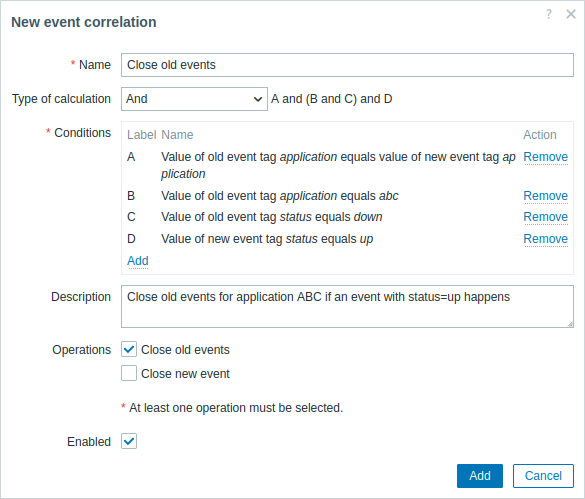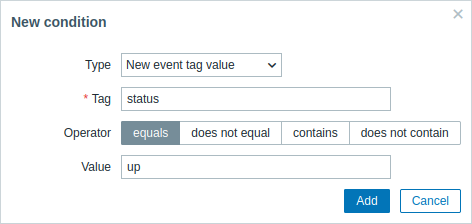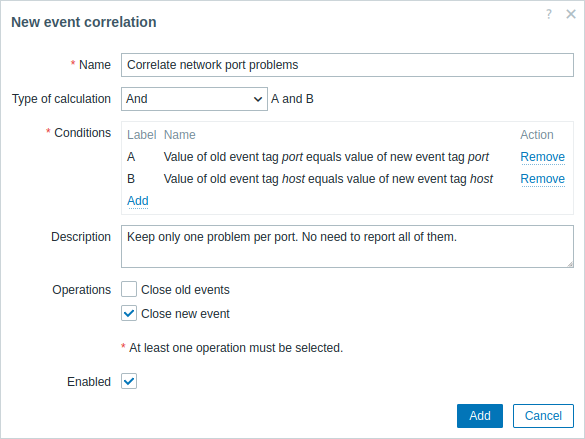2 Correlação global de eventos
Visão geral
A correlação global de eventos permite alcançar todas as métricas monitoradas pelo Zabbix e criar correlações.
É possível correlacionar eventos criados por triggers completamente diferentes e aplicar as mesmas operações a todos eles. Ao criar regras de correlação inteligentes, é possível se livrar de milhares de notificações repetitivas e focar nas causas raiz de um problema!
A correlação global de eventos é um mecanismo poderoso, que permite desvincular-se da lógica de problema e resolução baseada em um único trigger. Até agora, um único evento de problema era criado por um trigger e dependíamos desse mesmo trigger para a resolução do problema. Não podíamos resolver um problema criado por um trigger com outro trigger. Mas com a correlação de eventos baseada em tags de eventos, podemos.
Por exemplo, um trigger de log pode relatar problemas de aplicação, enquanto um trigger de polling pode relatar que a aplicação está ativa e funcionando. Aproveitando as tags de eventos, você pode marcar o trigger de log como status:down enquanto marca o trigger de polling como status:up. Então, em uma regra de correlação global, você pode relacionar esses triggers e atribuir uma operação apropriada a essa correlação, como fechar os eventos antigos.
Em outro uso, a correlação global pode identificar triggers semelhantes e aplicar a mesma operação a eles. E se pudéssemos receber apenas um relatório de problema por problema de porta de rede? Não há necessidade de relatar todos eles. Isso também é possível com a correlação global de eventos.
A correlação global de eventos é configurada em regras de correlação. Uma regra de correlação define como os novos eventos de problema são pareados com eventos de problema existentes e o que fazer em caso de correspondência (fechar o novo evento, fechar eventos antigos correspondentes gerando os respectivos eventos OK). Se um problema for fechado por correlação global, isso será relatado na coluna Info de Monitoramento > Problemas.
A configuração de regras de correlação global está disponível apenas para usuários do nível Super Admin.
A correlação de eventos deve ser configurada com muito cuidado, pois pode afetar negativamente o desempenho do processamento de eventos ou, se mal configurada, fechar mais eventos do que o pretendido (no pior caso, até mesmo todos os eventos de problema podem ser fechados).
Para configurar a correlação global com segurança, observe as seguintes dicas importantes:
- Reduza o escopo da correlação. Sempre defina uma tag exclusiva para o novo evento que será pareado com eventos antigos e use a condição de correlação Nome da tag do novo evento;
- Adicione uma condição baseada no evento antigo ao usar a operação Fechar evento antigo (caso contrário, todos os problemas existentes podem ser fechados);
- Evite usar nomes de tags comuns que possam acabar sendo usados por diferentes configurações de correlação;
- Mantenha o número de regras de correlação limitado ao que você realmente precisa.
Veja também: problemas conhecidos.
Configuração
Para configurar regras de correlação de eventos globalmente:
- Vá para Coleta de dados > Correlação de eventos
- Clique em Criar correlação de eventos à direita (ou no nome da correlação para editar uma regra existente)
- Insira os parâmetros da regra de correlação no formulário

Todos os campos obrigatórios estão marcados com um asterisco vermelho.
| Parâmetro | Descrição |
|---|---|
| Nome | Nome único da regra de correlação. |
| Tipo de cálculo | As seguintes opções de cálculo de condições estão disponíveis: E - todas as condições devem ser atendidas Ou - basta que uma condição seja atendida E/Ou - E com tipos de condição diferentes e Ou com o mesmo tipo de condição Expressão personalizada - uma fórmula de cálculo definida pelo usuário para avaliar as condições da ação. Deve incluir todas as condições (representadas por letras maiúsculas A, B, C, ...) e pode incluir espaços, tabulações, parênteses ( ), and (sensível a maiúsculas/minúsculas), or (sensível a maiúsculas/minúsculas), not (sensível a maiúsculas/minúsculas). |
| Condições | Lista de condições. Veja abaixo para detalhes sobre como configurar uma condição. |
| Descrição | Descrição da regra de correlação. |
| Operações | Marque a caixa de seleção da operação a ser executada quando o evento for correlacionado. As seguintes operações estão disponíveis: Fechar eventos antigos - fecha eventos antigos quando um novo evento ocorre. Sempre adicione uma condição baseada no evento antigo ao usar a operação Fechar eventos antigos ou todos os problemas existentes poderão ser fechados. Fechar novo evento - fecha o novo evento quando ele ocorre |
| Habilitado | Se você marcar esta caixa de seleção, a regra de correlação será habilitada. |
Para configurar os detalhes de uma nova condição, clique em  no bloco Condições. Uma janela pop-up será aberta onde você pode editar os detalhes da condição.
no bloco Condições. Uma janela pop-up será aberta onde você pode editar os detalhes da condição.

| Parâmetro | Descrição |
|---|---|
| Nova condição | Selecione uma condição para correlacionar eventos. Nota que se nenhuma condição de evento antigo for especificada, todos os eventos antigos podem ser correspondidos e fechados. Da mesma forma, se nenhuma condição de novo evento for especificada, todos os novos eventos podem ser correspondidos e fechados. As seguintes condições estão disponíveis: Nome da tag do evento antigo - especifique o nome da tag do evento antigo para correspondência. Nome da tag do novo evento - especifique o nome da tag do novo evento para correspondência. Grupo de hosts do novo evento - especifique o grupo de hosts do novo evento para correspondência. Par de tags de evento - especifique o nome da tag do novo evento e o nome da tag do evento antigo para correspondência. Neste caso, haverá uma correspondência se os valores das tags em ambos os eventos coincidirem. Os nomes das tags não precisam coincidir. Esta opção é útil para corresponder valores em tempo de execução, que podem não ser conhecidos no momento da configuração (veja também Exemplo). Valor da tag do evento antigo - especifique o nome e o valor da tag do evento antigo para correspondência, usando os seguintes operadores: igual - possui o valor da tag do evento antigo diferente - não possui o valor da tag do evento antigo contém - possui a string no valor da tag do evento antigo não contém - não possui a string no valor da tag do evento antigo Valor da tag do novo evento - especifique o nome e o valor da tag do novo evento para correspondência, usando os seguintes operadores: igual - possui o valor da tag do novo evento diferente - não possui o valor da tag do novo evento contém - possui a string no valor da tag do novo evento não contém - não possui a string no valor da tag do novo evento |
Como é possível uma má configuração, quando tags de eventos semelhantes podem ser criadas para problemas não relacionados, revise os casos descritos abaixo!
- As tags e valores de tags reais só se tornam visíveis quando um trigger dispara. Se a expressão regular usada for inválida, ela será silenciosamente substituída por uma string *UNKNOWN*. Se o evento inicial de problema com um valor de tag *UNKNOWN* for perdido, podem aparecer eventos OK subsequentes com o mesmo valor de tag *UNKNOWN* que podem fechar eventos de problema que não deveriam ter sido fechados.
- Se um usuário usar a macro {ITEM.VALUE} sem funções de macro como valor da tag, a limitação de 255 caracteres se aplica. Quando as mensagens de log são longas e os primeiros 255 caracteres não são específicos, isso também pode resultar em tags de eventos semelhantes para problemas não relacionados.
Exemplo
Pare eventos de problema repetitivos da mesma porta de rede.

Esta regra de correlação global irá correlacionar problemas se os valores das tags host e port existirem no trigger e forem os mesmos no evento original e no novo.
A operação irá fechar novos eventos de problema na mesma porta de rede, mantendo apenas o problema original aberto.

